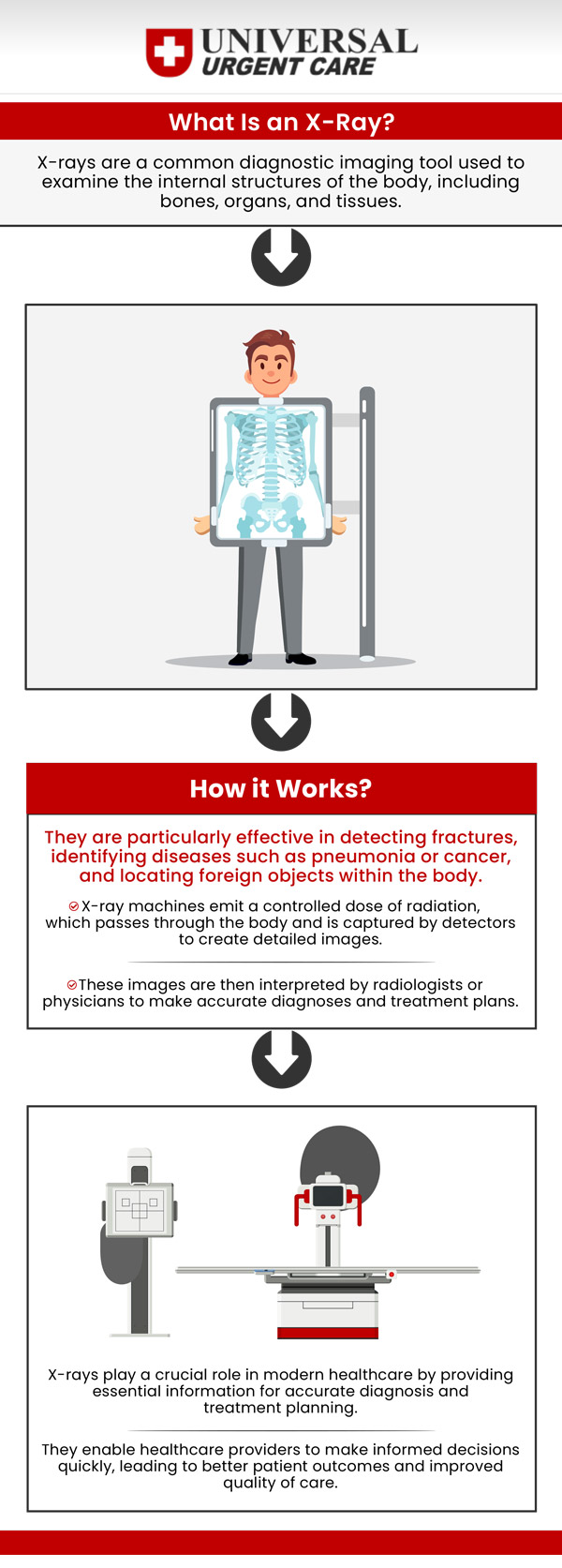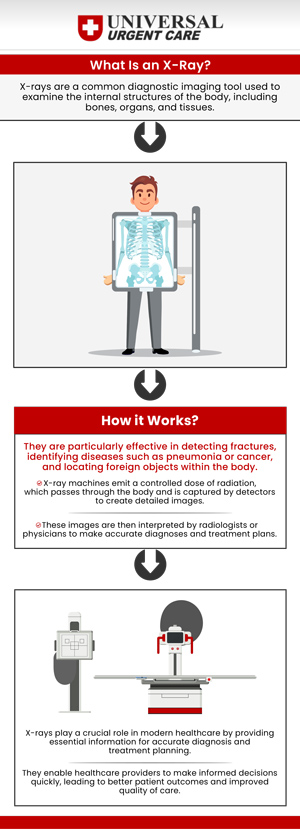X-Ray Services at Universal Urgent Care on Niles Street, Brimhall Road, and Ming Avenue in Bakersfield, CA
Our team utilizes advanced X-ray technology to provide clear and accurate diagnostic images, helping identify conditions such as fractures, infections, and diseases. We prioritize patient comfort and safety by using the lowest possible radiation dose while ensuring precise results. With our experienced staff and state-of-the-art equipment, we offer reliable and efficient X-ray services for a wide range of medical needs. For more information, contact us or book an appointment online. We are conveniently located at Niles Street, Brimhall Road, and Ming Avenue in Bakersfield, CA.


Table of Contents:
What is an X-ray and how does it work?
What conditions can an X-ray help diagnose?
How long does an X-ray procedure take?
Are X-rays safe?
X-ray technology plays a vital role in diagnosing and monitoring various health conditions by allowing us to non-invasively visualize the body’s internal structures. X-rays are high-energy electromagnetic radiation that pass through the body, with different tissues absorbing them at varying levels. Dense tissues like bones absorb more X-rays, appearing white on the image, while softer tissues appear gray, and air-filled spaces show as black. This contrast helps identify issues such as fractures, infections, or tumors.
The X-ray procedure is quick and straightforward, typically taking just a few minutes. You may be asked to wear a lead apron to protect parts of your body from radiation, and you will be positioned based on the area being examined. The machine targets the specific area, capturing an image that is analyzed by a radiologist for detailed insights into your health.
We prioritize safety by minimizing radiation exposure. While the radiation from a single X-ray is low, we use protective measures like lead aprons and shielding to ensure safety. X-rays are crucial for diagnosing conditions such as bone fractures, infections, and tumors, and for guiding certain medical procedures. They also play an important role in evaluating dental health.
If you have any concerns about undergoing an X-ray, our team is available to answer your questions and ensure you feel comfortable and confident during the process.
X-rays are an essential diagnostic tool, providing critical insights into a wide range of health conditions. For musculoskeletal issues, X-rays are key in diagnosing fractures and dislocations, allowing healthcare professionals to assess bone alignment and integrity to determine injury severity and plan treatment effectively.
Beyond bone-related concerns, X-rays are used to evaluate the chest and respiratory system, helping diagnose lung infections like pneumonia and detect fluid in the lungs, which can indicate conditions such as heart failure or pulmonary edema. This information allows for monitoring treatment and adjusting care plans.
X-ray technology also plays a vital role in dental care, helping assess the health of teeth and jawbones, identify cavities, impacted teeth, and periodontal disease. Additionally, it aids in evaluating the sinuses for conditions like sinusitis.
For abdominal concerns, X-rays are valuable in detecting gastrointestinal issues such as obstructions, perforations, or abnormal masses, including bowel obstructions and kidney stones. They are also crucial in monitoring chronic conditions like osteoarthritis by revealing changes in joint spaces and bone density.
In summary, X-rays are a cornerstone of diagnostic imaging, offering a non-invasive method to obtain vital information across a broad spectrum of medical conditions. This technology ensures accurate diagnoses and supports tailored treatment plans for optimal patient care.
X-ray procedures are typically quick and straightforward, often completed within a few minutes. The duration can vary depending on the specific area of the body being examined and the type of X-ray required. For standard X-rays, such as those of the chest, arms, or legs, the entire process typically takes about 10 to 15 minutes. This includes positioning the patient, capturing the images, and verifying their quality to ensure accurate diagnostics. The process is designed to be as efficient as possible, minimizing any wait time.
For more complex X-ray procedures, such as those requiring special positioning or the use of contrast media, additional time may be necessary. This ensures that comprehensive imaging is performed and that the results are accurate and detailed. Special preparations may be needed depending on the type of X-ray. For example, some patients may need to change into a hospital gown or may be required to discuss any health concerns with the skilled radiologic technologists performing the procedure.
At each step, the goal is to prioritize both efficiency and patient comfort. With state-of-the-art imaging technology and experienced staff, X-rays are conducted in a manner that minimizes discomfort and provides clear, accurate results. These procedures play a key role in diagnosing a variety of medical conditions quickly, allowing for timely and effective treatment. Overall, X-rays are a convenient, reliable diagnostic tool contributing to the overall quality of medical care.
X-rays are a vital diagnostic tool in modern medicine, allowing for non-invasive examination of the inside of the body. They help in the accurate diagnosis of conditions such as fractures, infections, and various diseases. To ensure patient safety, the lowest possible dose of radiation is used to achieve precise diagnostic results, following the principle of “As Low As Reasonably Achievable” (ALARA). This ensures each X-ray procedure is conducted with care, balancing the significant benefits of accurate diagnosis against the minimal risks associated with radiation exposure.
The radiation dose from a standard X-ray is minimal—comparable to the natural background radiation encountered in daily life—but additional precautions are taken for sensitive groups such as children and pregnant women. In these cases, alternative diagnostic methods may be explored, or protective measures implemented to further reduce exposure.
Trained medical professionals follow strict safety protocols to ensure that X-rays are performed only when truly necessary and beneficial. X-rays remain an invaluable part of diagnostic services, offering clear and effective imaging while prioritizing patient health and safety.
Medical professionals are available to provide detailed information and reassurance if you have any concerns regarding X-ray procedures or radiation exposure. Trust that X-rays, when used appropriately, are a safe and essential component of accurate and effective diagnostic care. For more information, contact us or book an appointment online. We are conveniently located at Niles Street, Brimhall Road, and Ming Avenue in Bakersfield, CA. We serve patients from Bakersfield CA, Clovis CA, Mayfair CA, Kayandee CA, Arvin CA, Fairfax CA, Rosedale CA, and surrounding areas.
Check Out Our 5 Star Reviews



Additional Services You May Need
▸ Illnesses Treatment
▸ Diagnostic Tests
▸ X-Rays
▸ Immunizations
▸ Vaccination
▸ Cold or Flu
▸ Upper Respiratory Infection
▸ Ear Infections
▸ Sore Throat
▸ Urinary Tract Infection
▸ Sprains & Strains
▸ Sports Injuries
▸ Minor Eye Injuries
▸ Minor Burns
▸ Flu Shots
▸ Sports Physicals Exams
▸ School Physicals Exams
▸ DOT Physicals
▸ View All Services


